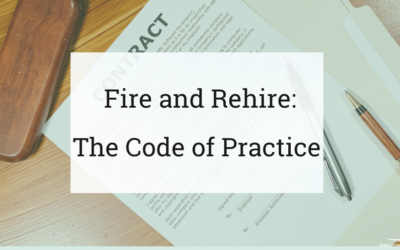Many employers face headaches when dealing with restrictive covenants, particularly during furlough. But what are restrictive covenants, and why are they important to you as an employer? How does furlough affect the restrictive covenants of my employees? This article should help to solve your HR headaches and explain how the current times are affecting restrictive covenants in the workplace.
Restrictive covenants are contractual terms aimed at protecting businesses against ex-employees working for competitors and or approaching customers of the business. The agreements restrict an employee’s actions during, and often after, their employment. Most commonly, the agreements will cover solicitation with clients (“non-solicitation” covenants), competing with the business (“non compete” covenants), or soliciting with other employees (“non-poaching” covenants).
They are enforceable in the High Court by injunctions against the ex-employee and/or their new company acting in a conspiracy to harm their former company’s business. While restrictive covenants are usually introduced and agreed upon at the start of employment in the employee’s contract, they can also be agreed during the course of employment or in termination discussions.
Can you add restrictive covenants to existing employment contracts?
They can be added into existing contracts in return for a little consideration (money usually) and are especially important in contracts of staff who are engaged with customers, for example, sales. Adding restrictions usually occurs during a promotion, which gives the employee new duties and therefore requires new restrictions to be placed upon the employee. Employers will need to ask the employee to sign a new agreement detailing the new covenants but no additional money has to be paid if the promotion includes new benefits or a salary increase.
Post-termination covenants, if not already expressly agreed, can be entered into during negotiations to terminate employment. They are usually included in settlement agreements but there is no reason why they cannot be agreed to and compensated for without a settlement agreement. Any new covenants should be tailored to protect the a genuine business concern. The need to protect the business must be balanced against a person’s right to earn a living and therefore be reasonable to the ex-employee. It is not usually possible to stop them from working for rival firms, carte blanche.
Much of what is mentioned in our “Why Contracts are important” article is also relevant here. Ensuring that your restrictive covenants are robust and can protect you as an employer should you need to fall back on them. We often find that restrictive covenants are not a “one size fits all” part of an agreement or contract, and we stress the importance of seeking advice and properly drafting restrictive covenants specific to your area of work and business.
How does furlough relate to restricted covenants?
When employees are on garden leave, usually any such period would reduce the lifetime of the restrictions. This raises the question of what happens when they are on furlough leave?
The concept of furlough is new and untested and some experts think that Courts will expect a similar reduction in the life of the restrictions to the impact which garden leave has. The reasons behind the concept is that in both cases the ex-employee will have been unable to make contact with customers or have access to confidential information; effectively having been taken out of the market already. Typically, restrictive covenants will have a provision that time spent in garden leave does reduce the time on a restrictive covenant, as not including this provision can leave open an opportunity for an employee to challenge the enforceability of the restrictive covenant. Flexible furlough might be different, however, due to continued contact with customers during that period.
HR headaches and restrictive covenants
HR headaches can occur when staff leave a business and it is important to know what you can and should do to protect your business and prevent customers from being poached. Employment Law Solutions can help you, for example, a client recently wanted to impose restrictions “there is no risk of him pinching my customers, I just want to make it awkward for him”. Employment Law Solutions can help.
We are an employment law service offering employment law advice for employers. With a wealth of knowledge in curing HR headaches for employers across the UK, Employment Law Solutions can offer comprehensive, stress-free, and pragmatic advice on employment law, including restrictive covenants, post-termination restrictions, and furlough. We offer 24/7, 365 guidance with a mission to help you get on with doing what you do best – running your business.




